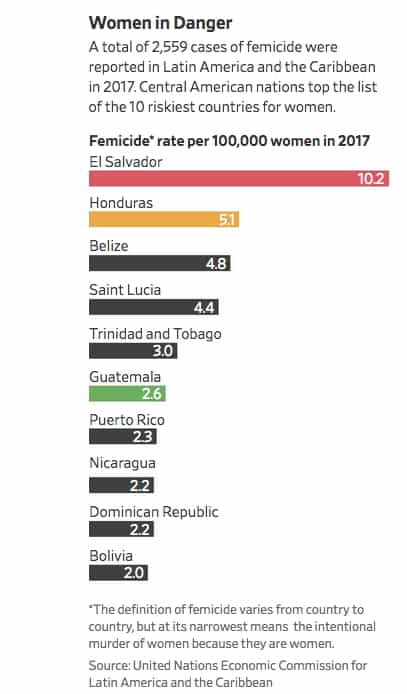Women in Latin America Are Being Murdered at Record Rates
Juan Forero, Wall Street Journal, December 19, 2018
{snip}
Latin America has the highest homicide rate in the world. The region’s most-murderous corner — the so-called Northern Triangle of Central America, including El Salvador, Honduras and Guatemala — annually registers the deaths of thousands of young men who shoot, stab, bludgeon and asphyxiate each other, often in gang-related violence.
Now, the Northern Triangle is turning deadly for women, too.
El Salvador, a tiny country of 6 million, has seen homicides of women more than double since 2013 to 469 last year. The death rate per 100,000 women, at 13.5, is more than six times that of the U.S., with Honduras and Guatemala close behind.
Gang violence has turbocharged the problem here, but doesn’t explain all of it. Women die disproportionately at the hands of men throughout much of Latin America. From Mexico to Brazil, episodes of lethal domestic violence are frequent staples on social media and television.
{snip}
What amounts to a public health crisis has women of all ages living in fear, according to researchers and interviews with dozens of women in El Salvador. As elsewhere in Latin America, the challenge is enormous for an overtaxed and poorly funded judicial system that can solve only a minority of homicides, let alone effectively prosecute rapes and spousal battery cases, also endemic here.
{snip}
Specialists studying violent crime in Central America say the killings of women often come at the hands of their partners, and that the rise of vicious gangs has added a tragic new dimension.
“Violence against women existed before the gangs,” said Angelica Rivas, a women’s rights lawyer. “The gangs make it worse.”
The two gangs that operate in nearly all of El Salvador’s 262 municipalities — MS-13 and Barrio 18 — treat women as little more than slaves, say law-enforcement authorities and women’s-rights advocates.
Once an initiated gang member, or homeboy as they call themselves, takes possession of a teenage girl or young woman, she risks a beating or death if she tries to leave without permission.
{snip}
The safe houses the gangs use to store weaponry, cash and contraband are also used to imprison girls, some as young as 12 and 13. Gang rape is not uncommon.
Families with girls in gang-controlled regions know they, too, can be targeted if a homeboy takes an interest. Saying “no” isn’t an option.
{snip}

Prosecutor Graciela Sagastume, who heads a new unit that investigates violence against women, said attacks have been so commonplace that Salvadoran society had become inured. She said that may be changing in the wake of several high-profile killings of professional women at the hands of their partners, among them a Health Ministry doctor beaten to death by her husband in January.
{snip}
Last year in El Salvador, 345 women became victims of what authorities classified as femicides, the killing of a woman for no other reason than her gender.
Unlike the killings of men, women slain here usually know their killers. In more than half the cases, it was a partner, ex-partner, family member or other acquaintance, including a gang member known to the victim.
Whereas men are often shot to death, women are killed with particular viciousness, according to a 2015 Salvadoran government study on femicides that noted how some victims had been tortured, had fingers cut off, been raped, tied up or burned.
“In many cases,” the report said, “the methods used surpassed those needed to cause death.”
{snip}
The Salvadoran government, with aid from the U.S., is developing courts to deal with violence against women and staffing them with specially trained prosecutors, judges and other personnel, among them psychologists, to work with victims. The number of cases of homicide processed has risen to 270 in 2017, from 130 in 2015. Convictions are still a minority of all cases but they rose from 76 in 2015 to 117 last year.
Judge Glenda Baires said the new system, which also handles assaults and sex crimes against women, is persuading more women to denounce their assailants. “Women are now saying, ‘I’m going to say something before I get killed,’” she said.
{snip}















